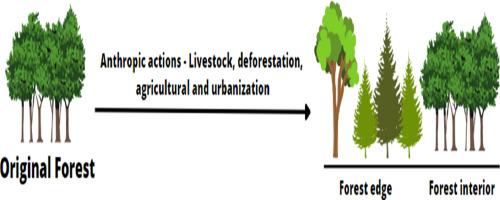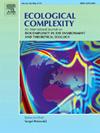巴西米纳斯吉拉斯州南部大西洋森林自然更新的边缘效应评价
IF 3.1
3区 环境科学与生态学
Q2 ECOLOGY
引用次数: 0
摘要
大西洋森林是世界上最具生物多样性但也最受威胁的生物群落之一,它经历了广泛的破碎化,导致了明显的边缘效应。本文研究了米纳斯吉拉斯州南部大西洋森林片段中边缘效应对物种多样性和自然更新结构的影响。我们沿两个样带建立了18个5 × 5 m样地,分析了植物社会学模式,并计算了再生个体的Shannon-Wiener多样性和Pielou均匀度指数(DBH <;5厘米,高1-3米)。结果表明,边缘效应显著影响物种组成和更新动态,在样带间呈现出明显的变化规律。样带2具有较高的物种稳定性,表明保护条件较好。这些发现强调了有针对性的保护策略的必要性,以减轻与边缘相关的干扰,并加强破碎景观中的森林更新。本文章由计算机程序翻译,如有差异,请以英文原文为准。

Edge effect evaluation on natural regeneration in fragment of Atlantic Forest, south of Minas Gerais, Brazil
The Atlantic Forest, one of the most biodiverse yet threatened biomes worldwide, has undergone extensive fragmentation, resulting in pronounced edge effects. This study investigates how edge effects influence species diversity and natural regeneration structure in an Atlantic Forest fragment in southern Minas Gerais. We established eighteen 5 × 5 m plots along two transects to analyze phytosociological patterns and calculated the Shannon-Wiener diversity and Pielou evenness indices for regenerating individuals (DBH < 5 cm, height 1–3 m). Results show that edge effects significantly influence species composition and regeneration dynamics, revealing distinct patterns between transects. Transect 2 exhibited greater species stability, suggesting better conservation conditions. These findings highlight the need for targeted conservation strategies to mitigate edge-related disturbances and enhance forest regeneration in fragmented landscapes.
求助全文
通过发布文献求助,成功后即可免费获取论文全文。
去求助
来源期刊

Ecological Complexity
环境科学-生态学
CiteScore
7.10
自引率
0.00%
发文量
24
审稿时长
3 months
期刊介绍:
Ecological Complexity is an international journal devoted to the publication of high quality, peer-reviewed articles on all aspects of biocomplexity in the environment, theoretical ecology, and special issues on topics of current interest. The scope of the journal is wide and interdisciplinary with an integrated and quantitative approach. The journal particularly encourages submission of papers that integrate natural and social processes at appropriately broad spatio-temporal scales.
Ecological Complexity will publish research into the following areas:
• All aspects of biocomplexity in the environment and theoretical ecology
• Ecosystems and biospheres as complex adaptive systems
• Self-organization of spatially extended ecosystems
• Emergent properties and structures of complex ecosystems
• Ecological pattern formation in space and time
• The role of biophysical constraints and evolutionary attractors on species assemblages
• Ecological scaling (scale invariance, scale covariance and across scale dynamics), allometry, and hierarchy theory
• Ecological topology and networks
• Studies towards an ecology of complex systems
• Complex systems approaches for the study of dynamic human-environment interactions
• Using knowledge of nonlinear phenomena to better guide policy development for adaptation strategies and mitigation to environmental change
• New tools and methods for studying ecological complexity
 求助内容:
求助内容: 应助结果提醒方式:
应助结果提醒方式:


